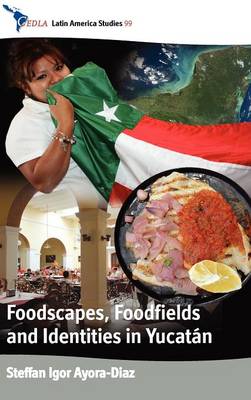
Stock image for illustration purposes only - book cover, edition or condition may vary.
Foodscapes, Foodfields, and Identities in the YucatA n
Steffan Igor Ayora Diaz
€ 149.69
FREE Delivery in Ireland
Description for Foodscapes, Foodfields, and Identities in the YucatA n
Hardback. The state of Yucatan has its own distinct culinary tradition, and local people are constantly thinking and talking about food. They use it as a vehicle for social relations but also to distinguish themselves from "Mexicans." This book examines the politics surrounding regional cuisine.. Series: CEDLA Latin American Studies. Num Pages: 324 pages, 1, black & white illustrations. BIC Classification: 1KLCM; JFCV; JHB. Category: (UP) Postgraduate, Research & Scholarly. Dimension: 235 x 159 x 22. Weight in Grams: 580.
Mexicans recently celebrated UNESCO's recognition of their cooking as an 'intangible cultural heritage of humanity,' but who defines the boundaries of a cuisine? Steffan Igor Ayora-Diaz's vivid account of Yucatecan culinary nationalism offers a timely reminder of the hegemonic reach of Mexico's national cuisine. He also employs valuable theoretical tools for analyzing the historical processes of culinary change that will be of interest to all students of food studies. Jeffrey M. Pilcher, University of Minnesota, and author of !Que vivan los tamales! Food and the Making of Mexican Identity. The state of Yucatan has its own distinct culinary tradition, and local people are constantly thinking and talking about food. They use it as a vehicle for social relations but also to distinguish themselves from Mexicans. This book examines the politics surrounding regional cuisine, as the author argues that Yucatecan gastronomy has been created and promoted in an effort to affirm the identity of a regional people and to oppose the hegemonic force of central Mexican cultural icons and forms. In particular, Yucatecan gastronomy counters the homogenizing drive of a national cuisine based on dominant central Mexican appetencies and defies the image of Mexican national cuisine as rooted in indigenous traditions. Drawing on post-structural and postcolonial theory, the author proposes that Yucatecan gastronomy - having successfully gained a reputation as distinct and distant from 'Mexican' cuisine - is a bifurcation from regional culinary practices. However, the author warns, this leads to a double, paradoxical situation that divides the nation: while a national cuisine attempts to silence regional cultural diversity, the fissures in the project of a homogeneous regional identity are revealed. Steffan Igor Ayora-Diaz is Professor of Anthropology at the Facultad de Ciencias Antropologicas, U. Autonoma de Yucatan. He received a PhD in anthropology from McGill University in 1993 and has conducted fieldwork in Italy and Mexico. His work has centered on globalization and local knowledge.
Product Details
Publisher
Berghahn Books United Kingdom
Number of pages
324
Format
Hardback
Publication date
2012
Series
CEDLA Latin American Studies
Condition
New
Weight
580g
Number of Pages
332
Place of Publication
Oxford, United Kingdom
ISBN
9780857452207
SKU
V9780857452207
Shipping Time
Usually ships in 15 to 20 working days
Ref
99-15
About Steffan Igor Ayora Diaz
Steffan Igor Ayora-Diaz is Professor of Anthropology at the Universidad Autonoma de Yucatan (UADY). He has done fieldwork in Sardinia (Italy), and in Chiapas and Yucatan (Mexico), and has published on local cultural practices (medicine, gastronomy, and identities) in the global, postcolonial, and modern context.
Reviews for Foodscapes, Foodfields, and Identities in the YucatA n
Mexicans recently celebrated UNESCO's recognition of their cooking as an 'intangible cultural heritage of humanity,' but who defines the boundaries of a cuisine? Steffan Igor Ayora-Diaz's vivid account of Yucatecan culinary nationalism offers a timely reminder of the hegemonic reach of Mexico's national cuisine. He also employs valuable theoretical tools for analyzing the historical processes of culinary change that will be of interest to all students of food studies.
Jeffrey M. Pilcher, University of Minnesota, and author of Que vivan los tamales! Food and the Making of Mexican Identity.
Jeffrey M. Pilcher, University of Minnesota, and author of Que vivan los tamales! Food and the Making of Mexican Identity.
